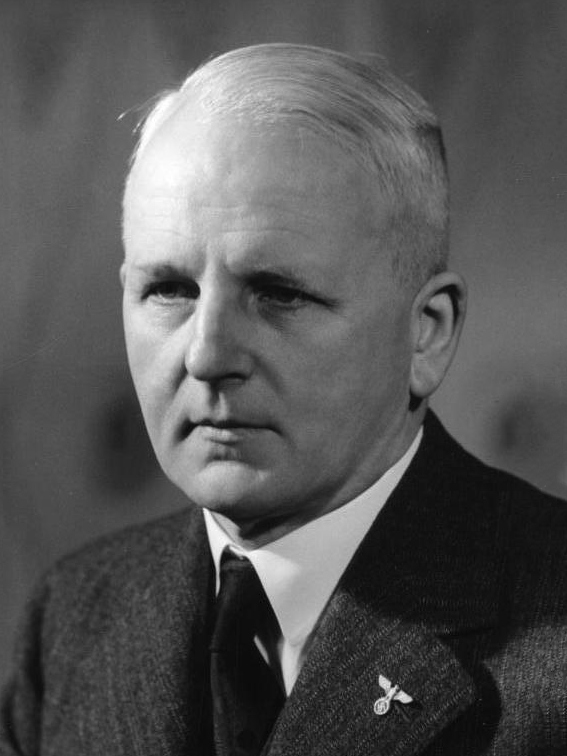Office R. M. (Dr. Kordt)
Unter Staats Sekretär Woerman-personally
M. D. Gaus-personally
Aboard the "Patria" 23 August 1938
SECRET PraS' G* K'
While in the forenoon of the 23rd of August the Fuehrer and the Regent [Reichverweser] of Hungary were engaged in a polit-
430
2796-PS
ical discussion, the Hungarian Minister Imredy and Kanya were in conference with Herr von Ribbentrop; Herr von Weizsacker also attended the conference.
Von Kanya introduced two subjects for discussion: 1. the negotiations between Hungary and the Little Entente; and 2. the . Czechoslovakian problem.
The comments of Kanya in regard to point 1: Negotiations with the Little Entente were mostly of a historical nature and offered really nothing new. In any case they were inadequate to explain sufficiently a communique submitted by Kanya at the end. This communique is to be issued today by the conference of the Little Entente. It would seem that Baron Aper in Budapest and Ambassador Bessenyi in Belgrade have agreed to it. Thus the question whether it would be opportune was really outdated. Nevertheless, it had to be discussed thoroughly in order to develop the German point of view. Von Ribbentrop described how in his opinion the renunciation of the use of force, which is to be proclaimed again, would not have the desired political effect, namely, a protection of Hungary against Yugoslavia especially in the event of a Hungarian-Czech crisis. On the contrary, Hungary would block the road for her intervention in Czechoslovakia and make it more difficult for the Yugoslavs to abandon their Czech confederates. The impartial reader would reason that Hungary was detaching herself from German-Czech politics and was waiving her claims for revision, for whoever did not participate would return with empty hands.
The counter arguments of Kanya were little convincing. They led into a discussion of point 2, namely, the attitude of Hungary in case of a German-tzech conflict.
Von Ribbentrop inquired what Hungary's attitude would be if the Fuehrer would carry out his decision to answer a new Czech provocation by force. The reply of the Hungarians presented two kinds of obstacles: The Yugoslavian neutrality must be assured if Hungary marches towards the North and perhaps the East. Moreover, the Hungarian rearmament had only been started and 1 to 2 more years' time for its development should be allowed.
Von Ribbentrop then explained to the Hungarians that the Yugoslavs would not dare to march while they were between the pincers of the Axis Powers. Rumania alone would therefore not move. England and France would also remain tranquil. England would not recklessly risk her Empire. She knew our newly acquired power. In reference to time, however, for the above-mentioned situation, nothing definite could be predicted since it
2796-PS
would depend on Czech provocation. Von Ribbentrop repeated that whoever desires revision must exploit the good opportunity and participate.
The Hungarian reply thus remained a conditional one. Upon the question of von Ribbentrop, what purpose the desired General Staff conferences were to have, not much more was brought forward than the Hungarian desire of a mutual inventory of military material and preparedness for the Czech conflict. The clear political basis for such a conference—the time of Hungarian intervention—was not obtained.
In the meantime, more positive language was used by Von Horthy in his talk with the Fuehrer. He wished not to hide his doubts with regard to the English attitude, but he wished to put Hungary's intention to participate on record. The Hungarian Ministers were and remained, even later, more skeptical since they feel more strongly about the immediate danger for Hungary with its unprotected flanks.
When Von Imredy had a discussion with the Fuehrer in the afternoon, he was very relieved when the Fuehrer explained, to him, that, in regard to the situation in question, he demanded nothing of Hungary. He himself would not know the time. Whoever wanted to join the meal would have to participate in the cooking as well. Should Hungary wish conferences of the General Staffs, he would have no objections.
The Hungarian position may be summed up today as follows:
a. Hungary is glad not to have to expect any inquiries of final character.
b. Hungary probably believes that she cannot intervene sooner than two weeks after the start of the conflict.
[Signed] Weizsacker
Memorandum on German-Hungarian discussions about Czechoslovakia, the possibility of Hungarian participation, and the possible reactions of other nations
Authors
Ernst Weizsaecker, von (State Secretary (Foreign Ministry); ambassador)
Ernst von Weizsaecker
German diplomat in the Nazi regime (1882-1951)

- Born: 1882-01-01 1882-05-25 (Stuttgart)
- Died: 1951-08-04 (Lindau)
- Country of citizenship: Germany
- Occupation: diplomat; politician
- Member of political party: Nazi Party
- Member of: Schutzstaffel
- Military rank: corvette captain
- Military branch: Imperial German Navy
Date: 23 August 1938
Defendant: Joachim Ribbentrop, von
Total Pages: 2
Language of Text: English
Source of Text: Nazi conspiracy and aggression (Office of United States Chief of Counsel for Prosecution of Axis Criminality. Washington, D.C. : U.S. Government Printing Office, 1946.)
Evidence Code: PS-2796
Citation: IMT (page 2340)
HLSL Item No.: 451903
Notes:The comments of Ribbentrop and Hitler are noted, along with those of Hungarian officials. Another copy of PS 2796 had been entered as US exhibit 88; this copy was used with the same exhibit number.
Trial Issue
Document Summary
PS-2796: Photostatic copy of secret record of meeting between Ribbentrop and Hungarian ministers
PS-2796: Discussion between Ribbentrop and the Hungarian ministers von imredy and von Kanya, 23 August 1938: Hungary’s relationship to the little entente; her attitude in case of conflict between Germany and Czechoslovakia; Hitler’s discussions with horthy and with imredy, same date, on the same questions
PS-2796: Secret Minutes of a Conference between Hitler and high Hungarian officials, dated 23 August 1938; signed by Weizsaecker.